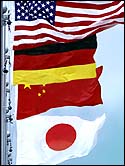
The Pursuit of Truth

| ||
|
Aron C. Mason Editor in Chief |

hen French political philosopher Charles de Montesquieu set out guidelines for a modern state in the 18th century, he not only laid the foundation for the French Revolution but ultimately for the U.S. Constitution.
The principle of dividing government power into three separate but equal parts — legislative, executive and judicial — has, ever since, been fundamental to democracy and preservation of individual liberty.
But over the years, a "fourth power" has emerged with an ever-greater presence on the stage of national affairs. And by closer analysis, this fourth factor appears, in many respects, to have elevated itself to its own "higher ground."
I am speaking of a power almost entirely outside government control: the influence of the press.
Battles between the press and government are as old as history. And the same history teaches, rightly, that a free press is often the best check against political tyranny.
But what happens if and when the media itself becomes party to efforts to violate the rights and freedoms of others?
It is not difficult to find examples where vigorous press campaigns have influenced lawmakers to accept measures for which there was no pressing need. Similarly, the press can cause the government to minimize or exaggerate its efforts to enforce existing laws.
And then there is the matter of obscuring or distracting from issues and information which affect the lives of millions. A politician once remarked, "If you can't convince them, confuse them," and recent events show that, at least for many in news media and those behind the scenes who craft their messages and content, this advice has been taken to heart, and deeply so.
Surveys show the public at large to be increasingly wise to this problem. A recent survey by the Roper Center at the University of Connecticut found that 54 percent of Americans feel that the news media "gets in the way" of solving society's problems. Leading the list of reasons for that perception: Sensationalism.
A recent case in point involves the nation's highest elected office. There can be no doubt that immoral and dishonest conduct is intolerable and, if found and proven in any sphere of government, Americans should not disregard it. But in all the media grandstanding and the "CNN effect" — efforts to keep news broadcasts filled 24 hours a day — certain very critical factors are lost. One is the presumption of innocence until guilt is proven. Another is that media sensationalization of unproven allegations can cause not only unjustifiable personal harm to the accused, but also, in this case, to the standing of the United States in the world community. It is undeniable that to dwell relentlessly on questions of presidential misconduct has the corollary effect of hurting not just the president but the presidency.
There is another side to the news media coin: those very important issues which touch countless lives and yet receive virtually no media notice, cast aside in favor of more "sensational" issues. By way of highly pertinent examples, consider that the U.S. Justice Department's Bureau of Justice Statistics recently announced that the nation's prisons and jails hold no less than 1,725,000 men and women — an unprecedented increase of more than 96,100 inmates over the prior year. Consider that "solutions" to the crime problem on most tables of government are calls for more prisons, a proposition beneficial only to the contractors who would build them. (Indeed, jail and prison construction is a leading growth industry.) And consider that outside our borders, well in excess of a billion people live under other forms of confinement, governed by regimes which deny fundamental human rights mandated by the Universal Declaration on Human Rights.

These are among the matters we examine in this edition of Freedom, broad challenges which cry out for broad discussion and address. We encourage journalists and citizens at large to dig in to these and other social concerns and problems with an eye to ideas and solutions. As we at Freedom reflect on 30 years as the Church of Scientology's voice for public service journalism, we feel the time is more right than ever to take a longer view of the world with the objective of making it a better place in the coming millennium.
Much of the news media, crying out for "reform" in others, itself could stand a good deal of introspection and reforming. In missing crucial aspects of the larger picture, the media does both itself and its consumers a monumental disservice. In stressing controversy and conflict, they miss that few beyond certain sports fans enjoy witnessing fights. In undervaluing clarity and directness, they undermine democracy, given the media is the intelligence service of a democratic people. Biased or false accounts are deadly in an intelligence system.
Franklin Roosevelt observed that "The truth is found when men are free to pursue it." We encourage all readers to exercise their freedom to seek out the truth, and to champion enhancing that freedom both for themselves and those not so free. And, as always, we welcome your views.

